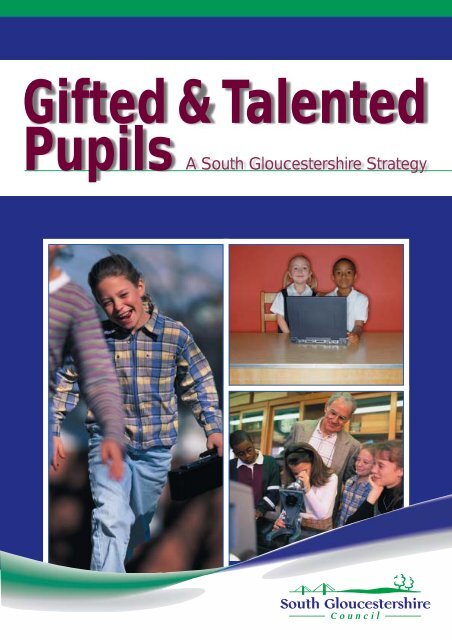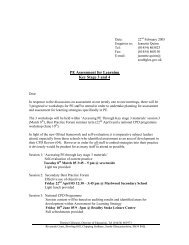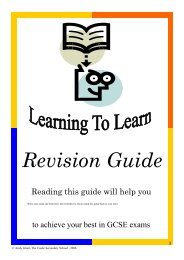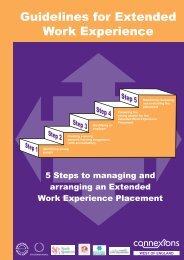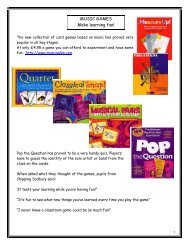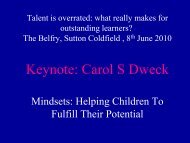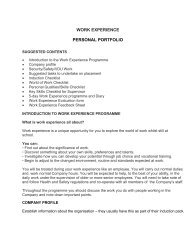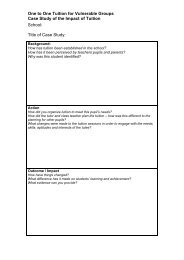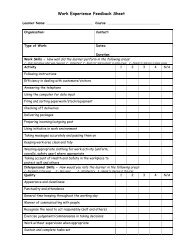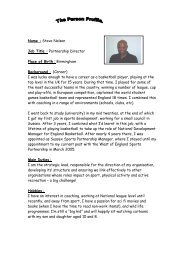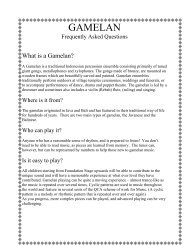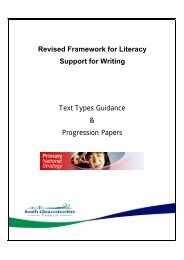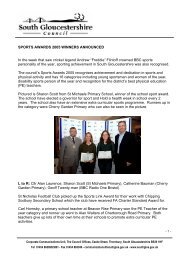Gifted & Talented Pupils
Gifted & Talented Pupils
Gifted & Talented Pupils
Create successful ePaper yourself
Turn your PDF publications into a flip-book with our unique Google optimized e-Paper software.
<strong>Gifted</strong> & <strong>Talented</strong><br />
<strong>Pupils</strong> A South Gloucestershire Strategy
<strong>Gifted</strong> & <strong>Talented</strong><br />
<strong>Pupils</strong> A South Gloucestershire Strategy<br />
Contents<br />
Introduction 3<br />
PAGE<br />
Local Education Authority:<br />
Aims 4<br />
Principals 4<br />
Support 4<br />
Definitions of <strong>Gifted</strong> and <strong>Talented</strong> <strong>Pupils</strong> 5<br />
Identification of <strong>Gifted</strong> and <strong>Talented</strong> <strong>Pupils</strong> 6<br />
School Policies for the Provision for <strong>Gifted</strong> and <strong>Talented</strong> <strong>Pupils</strong> 7<br />
The Role of the <strong>Gifted</strong> and <strong>Talented</strong> Co-ordinator 8<br />
A Checklist for Headteachers and Senior Managers 8<br />
Where to get help:<br />
Within South Gloucestershire LEA 9<br />
Organisations 9<br />
Web sites 10<br />
Resources 10<br />
References 10<br />
Appendices:<br />
Appendix 1: Further information on defining <strong>Gifted</strong> and <strong>Talented</strong> pupils 11<br />
Appendix 2: Checklist for Subject Identifiers 11<br />
Appendix 3: An Example of a Framework of a Policy for <strong>Gifted</strong> and <strong>Talented</strong> <strong>Pupils</strong> 14<br />
List of Organisations who have Endorsed the Strategy 15<br />
2
Introduction<br />
South Gloucestershire Local Education Authority<br />
(LEA) is committed to supporting schools in<br />
developing their provision for <strong>Gifted</strong> and <strong>Talented</strong><br />
pupils. This commitment is stated in the LEA<br />
Education Development Plan, which also gives<br />
details of specific LEA support actions.<br />
Work in South Gloucestershire echoes the national<br />
commitment to support the education of <strong>Gifted</strong><br />
and <strong>Talented</strong> pupils. There is a huge volume of<br />
information on this subject; the main sources are<br />
given in the ‘Where to get Help’ section of this<br />
guidance document.<br />
This document outlines the LEA’s principles, aims,<br />
intentions and expectations for supporting <strong>Gifted</strong><br />
and <strong>Talented</strong> pupils, upon which schools can build<br />
their own policies and guidelines.<br />
The guidelines contained in this document build<br />
upon an earlier document, produced in 2000. This<br />
was revised by the LEA Steering Group during the<br />
summer and autumn of 2003, using resources<br />
from the Department for Education and Skills and<br />
from the National Curriculum.<br />
Further information on developing provision for<br />
<strong>Gifted</strong> and <strong>Talented</strong> pupils, based on good practice<br />
in South Gloucestershire and beyond, is published<br />
in a regular LEA Newsletter.<br />
3
Local Education Authority Aims, Principals and Support<br />
LEA Aims<br />
The LEA aim (taken from the Educational<br />
Development Plan, 2002-2007) is to<br />
ensure effective, engaging and enriching<br />
education for all learners.<br />
In relation to <strong>Gifted</strong> and <strong>Talented</strong> pupils,<br />
the LEA aims to:<br />
● Encourage and support schools so that they<br />
can identify <strong>Gifted</strong> and <strong>Talented</strong> pupils, write<br />
their own policies and guidelines, provide an<br />
appropriate curriculum, create assessment<br />
procedures that ensure their progress and<br />
raise the awareness of the school community<br />
to their educational and social needs;<br />
● Create networks of teachers interested in<br />
promoting the education and welfare and<br />
education of <strong>Gifted</strong> and <strong>Talented</strong> pupils;<br />
● Encourage positive links for <strong>Gifted</strong> and<br />
<strong>Talented</strong> pupils between schools, across key<br />
stages and into higher or further education;<br />
● Provide schools with up-to-date and relevant<br />
information concerning local and national<br />
support for developing provision for <strong>Gifted</strong><br />
and <strong>Talented</strong> pupils.<br />
LEA Principles<br />
1. South Gloucestershire LEA is committed<br />
to the principles of:<br />
● Equality and inclusion;<br />
● Lifelong learning;<br />
● Every pupil achieving his or her potential;<br />
● Raising achievement for all through a curriculum<br />
that is broad, balanced and meets the needs of<br />
individuals or groups.<br />
2. <strong>Gifted</strong> and <strong>Talented</strong> pupils have the same<br />
education entitlement as other pupils:<br />
● Their needs will be identified;<br />
● Their potential will be realised through work<br />
and enrichment opportunities, carefully matched<br />
to their assessed needs;<br />
● Their progress will be monitored;<br />
● Their teachers will be supported appropriately;<br />
● Their parents or carers will be involved as<br />
partners in the educational process.<br />
3. All pupils benefit from an enriching and challenging<br />
curriculum, such as that developed for <strong>Gifted</strong> and<br />
<strong>Talented</strong> pupils.<br />
LEA Support<br />
The LEA Advisory Service will work with other sections,<br />
including the Psychology Service, to promote the above<br />
LEA aims and principles.<br />
The LEA will Identify, promote and disseminate good<br />
practice in the provision for <strong>Gifted</strong> and <strong>Talented</strong> pupils in<br />
South Gloucestershire by:<br />
● Supporting schools in the development<br />
of increased understanding of the needs<br />
of <strong>Gifted</strong> and <strong>Talented</strong> pupils;<br />
● Providing and encouraging enrichment<br />
and the development of wider horizons<br />
and higher expectations;<br />
● Helping schools to recognise the leadership<br />
and management issues relating to the provision<br />
for <strong>Gifted</strong> and <strong>Talented</strong> pupils;<br />
● Highlighting and sharing examples of good<br />
practice between educational providers;<br />
● Monitoring data and school performance indicators;<br />
● Encouraging innovative curriculum development<br />
work and research;<br />
● Providing references to helpful books, publications,<br />
professional expertise and organisations;<br />
● Promoting links with other LEAs and<br />
educational establishments (e.g. schools,<br />
colleges and universities) and maintaining<br />
an overview of these links;<br />
● Promoting awareness of, and participation in,<br />
national initiatives and activities in relation to<br />
developing <strong>Gifted</strong> and <strong>Talented</strong> pupils.<br />
The Education Service will, subject to needs analysis,<br />
include courses about <strong>Gifted</strong> and <strong>Talented</strong> pupils in its<br />
professional development programmes for teachers and<br />
in the governor development programme.<br />
4
Definitions of <strong>Gifted</strong> and <strong>Talented</strong> <strong>Pupils</strong><br />
In Summary:<br />
There are many definitions of <strong>Gifted</strong> and <strong>Talented</strong><br />
pupils. None of them are precise. This guidance<br />
takes and uses the now nationally adopted<br />
terminology in relation to pupils who, in previous<br />
LEA guidance documents, have been referred to<br />
as being ‘very able’ or ‘exceptionally able’. The<br />
term ‘more able’ is also used.<br />
Schools may use this guidance to adopt their own<br />
definitions as outlined in their policy for <strong>Gifted</strong> and<br />
<strong>Talented</strong> pupils. Further information on defining <strong>Gifted</strong><br />
and <strong>Talented</strong> pupils is given in Appendix 1.<br />
<strong>Gifted</strong> and <strong>Talented</strong><br />
Nationally, and in South Gloucestershire LEA, gifted<br />
pupils are defined as having academic ability in one or<br />
more subject areas, whereas talented pupils are those<br />
with ability in creative arts or sports.<br />
More able, very able and exceptionally able pupils<br />
More Able<br />
Very Able<br />
Exceptionally<br />
Able<br />
<strong>Pupils</strong> attain above average standards.<br />
For example, they perform above national<br />
expectations in NC tests or reach levels<br />
beyond what is or could be expected in<br />
other curriculum areas or in creative or<br />
sporting fields.<br />
<strong>Pupils</strong> reach standards in their academic,<br />
artistic or sporting achievements which<br />
are in the top 10% of all* performance.<br />
<strong>Pupils</strong> reach standards in their academic,<br />
artistic or sporting achievements which<br />
are in the top 2% of all* performance<br />
* In this context, “all” is relative to<br />
the school the pupil attends.<br />
<strong>Gifted</strong> and<br />
<strong>Talented</strong> = very able including exceptionally able<br />
<strong>Gifted</strong> and <strong>Talented</strong> pupils are those (approximately<br />
10%) of pupils who are very able in one or more<br />
subjects or in creative arts or sports, INCLUDING those<br />
(approximately 2%) who are exceptionally able.<br />
These are pupils who achieve, or who have the ability to<br />
achieve at a level significantly in advance of the average<br />
for their year group in their school.<br />
In defining <strong>Gifted</strong> and <strong>Talented</strong> pupils, the following<br />
issues should be taken into account:<br />
● The number and abilities of <strong>Gifted</strong> and <strong>Talented</strong><br />
pupils will not be the same in every school.<br />
● Schools may use this guidance to adopt their<br />
own definitions as outlined in their policy for<br />
<strong>Gifted</strong> and <strong>Talented</strong> pupils. Consequently, the<br />
dividing line between ‘more able’, ‘very able’<br />
and ‘exceptionally able’ pupils cannot be<br />
defined precisely.<br />
● A pupil may demonstrate high ability over many<br />
areas of the curriculum. Equally, a pupil may be<br />
considered very able in only one area.<br />
● <strong>Gifted</strong> and <strong>Talented</strong> pupils may under-achieve,<br />
for example if they are not presented with the<br />
right opportunity at the right time, do not work<br />
within a curriculum that promotes creativity<br />
and enjoyment, do not benefit from teacher<br />
recognition and encouragement or develop<br />
positive peer recognition.<br />
● <strong>Gifted</strong> and <strong>Talented</strong> pupils may not wish to be<br />
identified as such by their peers or by adults.<br />
● Motivation of pupils may be limited by their wish<br />
to avoid peer pressure of all kinds and they may<br />
choose to ‘coast’ through the curriculum.<br />
● Hidden gifts and talents may be obscured by<br />
behavioural difficulties, autism, dyslexia or other<br />
factors unrecognised by adults.<br />
5
Identification of <strong>Gifted</strong><br />
and <strong>Talented</strong> <strong>Pupils</strong><br />
Schools should be able to identify their <strong>Gifted</strong><br />
and <strong>Talented</strong> pupils through the professional<br />
judgment, knowledge and experience of individual<br />
or the collective staff of the school. Identification<br />
should be an agreed, continuous, whole school<br />
process. It should match the school’s definition<br />
of <strong>Gifted</strong> and <strong>Talented</strong> pupils.<br />
Schools should ensure that the identification process is<br />
rigorous, transparent, fair and inclusive. The process<br />
should be flexible in order to meet the needs of pupils<br />
who may join the school part way through a year or key<br />
stage. <strong>Pupils</strong>’ gifts or talents may be recognised at any<br />
time or in any area of school life.<br />
Where possible, schools should work closely with<br />
‘feeder’ schools at all key stages in order to promote<br />
continuity and progression for pupils.<br />
<strong>Gifted</strong> and <strong>Talented</strong> under-achievers are particularly<br />
difficult to identify. Schools should monitor their<br />
arrangements to ensure that they are not simply<br />
identifying those who are already high achievers.<br />
The identification process will need to take into<br />
account factors such as motivation, personality and<br />
home background. These factors are significant in<br />
converting potential into performance.<br />
There are many checklists available for teachers to<br />
use when identifying <strong>Gifted</strong> and <strong>Talented</strong> pupils. A<br />
general checklist may be a starting point for a school,<br />
but this should be supplemented by subject-specific<br />
lists of identifiers, especially in Key Stages 3, 4 and<br />
at post-16. Examples of typical identifiers can be found<br />
in Appendix 2 of this document.<br />
The main methods of identification are:<br />
● testing, formally or informally<br />
● tracking<br />
● nomination by teachers, parents and peers<br />
● providing pupils with the opportunities in which<br />
to succeed, from which it should become clear<br />
if pupils have, or have not, notable ability.<br />
The LEA will carry out an audit in order to<br />
facilitate sharing of good practice, to identify <strong>Gifted</strong><br />
and <strong>Talented</strong> pupils.<br />
The school’s own definitions of <strong>Gifted</strong> and<br />
<strong>Talented</strong> pupils and main methods of identification<br />
should be included in the school’s agreed policy<br />
and guidance documents. In addition, the policy or<br />
guidelines should state how the identification<br />
process is to be managed, who will be involved<br />
and when and how it is to take place.<br />
Schools will also need to consider to what extent the<br />
outcomes will be publicised within the school and how<br />
decisions will be explained and justified to parents.<br />
6
School Policies for the<br />
Provision for <strong>Gifted</strong> and <strong>Talented</strong> <strong>Pupils</strong><br />
Provision needs to be underwritten by an agreed<br />
whole school policy that is regularly monitored and<br />
reviewed by staff and governors. Appendix 3 gives<br />
examples of frameworks for such policies.<br />
Schools are recommended to identify a member of<br />
staff who has a specific interest in and who will take<br />
a lead in the development of provision for <strong>Gifted</strong><br />
and <strong>Talented</strong> pupils.<br />
<strong>Pupils</strong> identified as <strong>Gifted</strong> and <strong>Talented</strong> should be listed<br />
on a register and their progress regularly monitored with<br />
appropriate parental involvement if possible.<br />
Provision for <strong>Gifted</strong> and <strong>Talented</strong> pupils should<br />
be carefully matched to their assessed needs and<br />
potential. This should be coupled with a realistic<br />
expectation of progress and the anticipated outcomes<br />
that also match the assessed ability. Tasks should be<br />
more advanced, open-ended and flexible than those<br />
for average ability pupils and thus offer an enriched,<br />
extended curriculum.<br />
Enrichment and extension are words that are often<br />
interchanged and confused. In this document the<br />
following definitions are used:<br />
Enrichment<br />
● Given experiences to broaden horizons.<br />
● An experience offered in the classroom designed<br />
to supplement and enrich the normal curriculum.<br />
● The enrichment task/work must not simply be<br />
a repetition of previous activities.<br />
Extension<br />
In extension work the student moves to higher order<br />
skills; for example, from knowledge to comprehension<br />
and application, from analysis to synthesis and finally<br />
to evaluation.<br />
Extra curricular provision<br />
Where appropriate this should aim to:<br />
● Provide the enrichment and extension needed<br />
across curriculum areas;<br />
● Highlight awareness amongst the staff of<br />
the need to provide challenging work for <strong>Gifted</strong><br />
and <strong>Talented</strong> pupils;<br />
● Provide an opportunity to enhance the pupil’s<br />
independence in learning;<br />
● Provide situations to develop skills and<br />
acquire new ones;<br />
● Promote individual learning programmes,<br />
as appropriate to the needs of the pupil.<br />
Provision should aim to be inclusive for all pupils.<br />
Provision may comprise withdrawal from the main<br />
class or separate grouping if that will clearly meet<br />
the pupils’ needs. Due care and consideration has<br />
to be taken with organisational systems such as<br />
streaming, setting, banding, extraction, promotion,<br />
acceleration and fast tracking.<br />
The social needs of <strong>Gifted</strong> and <strong>Talented</strong> pupils<br />
are very important.<br />
If social needs of <strong>Gifted</strong> and <strong>Talented</strong> pupils are<br />
ignored or over-ridden, there may be a counterproductive<br />
effect on the aim of raising standards<br />
of achievements for the pupils. For example, pupils<br />
accelerated into an older year group in the interests of<br />
their academic achievement, may find that they are not<br />
socially equal to or happy in the situation. This is likely<br />
to have a detrimental effect on academic results and<br />
social outcomes for <strong>Gifted</strong> and <strong>Talented</strong> pupils.<br />
7
The Role of the <strong>Gifted</strong> and <strong>Talented</strong> Coordinator<br />
The role of the coordinator will depend on the size and education phase of the school.<br />
The job description of a co-ordinator of <strong>Gifted</strong> and<br />
<strong>Talented</strong> pupils in the school should be:<br />
● To ascertain the professional development needs<br />
of staff and work with the headteacher to provide<br />
appropriate support;<br />
● To draw up/revise the school policy for <strong>Gifted</strong><br />
and <strong>Talented</strong> pupils, with regard to the national<br />
and local agenda;<br />
● To assist subject leaders in revising subject<br />
policies to take account of the needs of <strong>Gifted</strong><br />
and <strong>Talented</strong> pupils;<br />
● To assist subject leaders in providing suitable<br />
resources for <strong>Gifted</strong> and <strong>Talented</strong> pupils;<br />
● To ensure that identification procedures are in<br />
place throughout the school and that they are<br />
used to maintain a register of <strong>Gifted</strong> and<br />
<strong>Talented</strong> pupils;<br />
● To advise on the setting of appropriate targets<br />
for <strong>Gifted</strong> and <strong>Talented</strong> pupils;<br />
● To promote extra-curricular activities and<br />
involvement in the wider community for <strong>Gifted</strong><br />
and <strong>Talented</strong> pupils;<br />
● To ensure that appropriate records are kept<br />
and passed on to the next phase of education;<br />
● To ensure that parents are kept fully<br />
informed about the progress of their <strong>Gifted</strong><br />
and <strong>Talented</strong> children;<br />
● To review educational literature related to<br />
<strong>Gifted</strong> and <strong>Talented</strong> pupils and bring this to<br />
the attention of staff;<br />
The coordinator will also need to keep the governing<br />
body informed of the following:<br />
● The number of pupils who are on the register;<br />
● The variety of abilities and talents that<br />
are represented;<br />
● The strategies that have been implemented<br />
to cater for these pupils;<br />
● Details of any in-service provision and impact<br />
of training on pupil achievements;<br />
● An outline of any special projects that have<br />
been undertaken by <strong>Gifted</strong> and <strong>Talented</strong> pupils;<br />
● Future priorities, including resources;<br />
● Pupil views and preferred learning strategies.<br />
A Checklist for Headteachers and Senior Managers<br />
● All staff should have an awareness of<br />
the key issues in the education of <strong>Gifted</strong><br />
and <strong>Talented</strong> pupils;<br />
● A school policy exists to support <strong>Gifted</strong><br />
and <strong>Talented</strong> pupils;<br />
● <strong>Gifted</strong> and <strong>Talented</strong> pupils are mentioned<br />
in subject policies;<br />
● Staff and governors should engage in training<br />
to support aspects of the education of <strong>Gifted</strong><br />
and <strong>Talented</strong> pupils;<br />
● Staff development and deployment shows<br />
awareness of issues for <strong>Gifted</strong> and <strong>Talented</strong><br />
pupils in the school;<br />
● The school designates a teacher who has<br />
responsibility for the identification and provision<br />
for <strong>Gifted</strong> and <strong>Talented</strong> pupils;<br />
● Effective systems exist to facilitate the<br />
identification of <strong>Gifted</strong> and <strong>Talented</strong> ability;<br />
● Extension, challenge and enrichment exists<br />
in medium and short term planning;<br />
● Systems exist for tracking progress of<br />
individual <strong>Gifted</strong> and <strong>Talented</strong> pupils;<br />
● <strong>Gifted</strong> and <strong>Talented</strong> pupils are mentioned<br />
in the prospectus;<br />
● An element of the budget recognises the needs<br />
of <strong>Gifted</strong> and <strong>Talented</strong> pupils as appropriate;<br />
● Work from <strong>Gifted</strong> and <strong>Talented</strong> pupils is<br />
discussed at staff meetings from time to time;<br />
● A portfolio of outstanding work by <strong>Gifted</strong><br />
and <strong>Talented</strong> pupils exists as appropriate;<br />
● Achievement is recognised and rewarded within a<br />
school ethos which recognises that achievement<br />
and success is acceptable for ALL pupils.<br />
Based on: Deborah Eyre, 1997 Curriculum provision<br />
for the <strong>Gifted</strong> and <strong>Talented</strong> in the Primary/Secondary<br />
School, NACE/David Fulton publication.<br />
8
Where to get help<br />
Within South Gloucestershire LEA:<br />
Julia Mabey, School Improvement Adviser<br />
Education Department<br />
Bowling Hill<br />
Chipping Sodbury<br />
South Gloucestershire BS37 6JX.<br />
Telephone: 01454 868968<br />
Denis de Souza, Inclusion Strategy Manager<br />
Education Department<br />
Bowling Hill<br />
Chipping Sodbury<br />
South Gloucestershire BS37 6JX<br />
Telephone: 01454 863272<br />
http://www.southglos.gov.uk/ed/advisory/<br />
Organisations:<br />
National Association for Able Children in Education<br />
(NACE)<br />
PO Box 242<br />
Arnolds Way<br />
Oxford OX2 9FR<br />
Telephone: 01865 861879<br />
Fax: 01865 861880<br />
http://www.nace.co.uk<br />
Email: info@nace.co.uk<br />
(Professional Association for teachers<br />
and others in education)<br />
National Association for <strong>Gifted</strong> Children (NAGC)<br />
Elder House<br />
Milton Keynes MK9 1LR<br />
Telephone: 0845 450221<br />
Fax: 0870 7703219<br />
http://www.nagcbritian.org.uk<br />
National Academy for <strong>Gifted</strong> and <strong>Talented</strong> Youth<br />
The University of Warwick<br />
Coventry CV4 7AL<br />
Telephone: 02476 574213<br />
Brunel Able Children’s Education Centre<br />
Brunel University<br />
Twickenham Campus<br />
300 St Margaret’s Road<br />
Twickenham TW1 1PT<br />
Telephone 0208891 0121 ext 2070<br />
RECAP Research Centre for Able <strong>Pupils</strong>,<br />
Westminster Institute of Education,<br />
Oxford Brookes University<br />
Harcourt Hill<br />
Oxford OX2 9AT<br />
Telephone: 01865 488278<br />
MENSA Foundation for <strong>Gifted</strong> Children<br />
Mensa House, St John’s Square<br />
Wolverhampton WV2 4AH<br />
(For children of high IQ)<br />
Telephone: 01902 772771<br />
The European Council for High Ability (ECHA)<br />
(affiliated membership)<br />
Dr. Harald Wagner,<br />
Bildung und Begabung<br />
Kennedyallee 62-70<br />
53175 Bonn<br />
Germany<br />
Telephone: +49 228 95915-0<br />
Fax: +49 228 9599915-19<br />
Email: 113322.152@compuserve.com<br />
(European Research Association)<br />
World Council for <strong>Gifted</strong> and <strong>Talented</strong> Children<br />
(WCGTC) (affiliated membership)<br />
18401 Hiawatha Street<br />
Northridge<br />
CA 91326<br />
USA<br />
Telephone: 818 368 7501<br />
Fax: 818 368 2163<br />
http://www.World<strong>Gifted</strong>.org<br />
Email: worldgt@earthlink.net<br />
9
Web sites<br />
Xcalibre<br />
http://www.xcalibre.ac.uk<br />
Nrich<br />
http://www.nrich.maths.org<br />
Ohio Association for <strong>Gifted</strong> Children<br />
http://www.oagc.com<br />
QCA<br />
http://www.qca.org.uk<br />
CASE<br />
http://www.case-network.org<br />
Scottish Council for Research in Education<br />
http://www.scre.ac.uk<br />
BBC School online<br />
http://www.bbc.co.uk/education/schools<br />
<strong>Talented</strong> and <strong>Gifted</strong> Educational Resources<br />
http://www.uis.edu/~schroede/school/taglink.htm<br />
10 Downing Street<br />
http://www.number-10.gov.uk<br />
DfES Thinking Skills<br />
http://www.standards.dfes.gov.uk/thinkingskills/<br />
How Stuff Works<br />
http://www.howstuffworks.com<br />
Science Museum<br />
http://www.sciencemuseum.org.uk<br />
Teaching Ideas for Primary Teachers<br />
http://www.teachingideas.co.uk<br />
21st Century Learning Initiative<br />
http://www.21learn.org<br />
References<br />
OFSTED Handbook for Inspecting Primary and Nursery<br />
Schools 2003, The Stationery Office.<br />
Office for Standards in Education (1998), Educating the<br />
Very Able, Current International Research, The Stationery<br />
Office.<br />
DfEE (2000), Summer Schools for <strong>Gifted</strong> and <strong>Talented</strong><br />
<strong>Pupils</strong>, DfEE Circular to Chief Education Officers.<br />
Devon Curriculum Services, Great Moor House, Bittern<br />
Road, Sowton, Exeter, Devon, EX2 7NL; <strong>Gifted</strong> and <strong>Talented</strong><br />
Handbook 2003.<br />
National Association for <strong>Gifted</strong> Children (NAGC), Elder<br />
House, Milton Keynes, MK9 1LR.<br />
National Association for Able Children in Education (NACE),<br />
NACE National Office, PO Box 242, Arnolds Way, Oxford,<br />
OX2 9FR.<br />
National Academy for <strong>Gifted</strong> and <strong>Talented</strong> Youth,<br />
The University of Warwick, Coventry, CV4 7AL.<br />
Curriculum Provision for the <strong>Gifted</strong> and <strong>Talented</strong> in the<br />
Primary School, Edited by Deborah Eyre and Lynne<br />
McClure, 2001, NACE/Fulton Publication,<br />
ISBN 1-85346-771-5.<br />
10
Appendices<br />
Appendix 1:<br />
Further information on<br />
defining G&T pupils Source NAGC<br />
Appendix 2:<br />
Checklist for<br />
Subject Identifiers<br />
More able pupil<br />
<strong>Gifted</strong> learner<br />
English for <strong>Gifted</strong> and <strong>Talented</strong> <strong>Pupils</strong><br />
● Knows the answers<br />
● Is interested<br />
● Is attentive<br />
● Has good ideas<br />
● Works hard<br />
● Answers questions<br />
● Top groups<br />
● Listens with interest<br />
● Learns with ease<br />
● 6-8 repetitions<br />
to mastery<br />
● Understands ideas<br />
● Enjoys peers<br />
● Grasps the meaning<br />
● Asks the questions<br />
● Is highly curious<br />
● Is mentally and<br />
physically involved<br />
● Has wild silly ideas<br />
● Plays around yet<br />
tests well<br />
● Discusses in detail,<br />
elaborates<br />
● Beyond groups<br />
● Shows strong feelings<br />
and opinions<br />
● Already knows<br />
● 1-2 repetitions<br />
to mastery<br />
● Constructs abstractions<br />
● Prefers adults<br />
● Draws inferences<br />
● Completes assignments ● Initiates projects<br />
● Is receptive<br />
● Copies accurately<br />
● Enjoys school<br />
● Absorbs information<br />
● Technician<br />
● Good at memorising<br />
● Enjoys straightforward<br />
sequential presentation<br />
● Is alert<br />
● Is pleased with<br />
own learning<br />
● Is intense<br />
● Creates a new design<br />
● Enjoys learning<br />
● Manipulates information<br />
● Inventor<br />
● Good at guessing<br />
● Thrives on complexity<br />
● Is keenly observant<br />
● Is highly self critical<br />
What does it mean to be gifted and talented in terms of<br />
English and literacy?<br />
Identification of gifted and talented pupils<br />
● Able to generalise from their reading<br />
experience, latching on very quickly to<br />
the conventions of different writing.<br />
● Highly active readers able to infer, deduce<br />
and empathise, and also remain sensitive<br />
to subtitles in the text.<br />
● Capacity to immerse themselves in their<br />
reading and writing.<br />
● Highly creative, being able to manipulate<br />
language and orchestrate their writing.<br />
● Highly articulate, using apt terminology<br />
adeptly as well as having a rich, varied<br />
vocabulary and sentence structure.<br />
● Brave in writing, willing to take risks<br />
and experiment with new styles.<br />
● Prone to think in original and divergent ways.<br />
Caution<br />
● <strong>Gifted</strong> and talented pupils sometimes try to<br />
conceal their intelligence because high ability<br />
is mocked or resented by other pupils. They<br />
may be reticent in class and difficult to involve.<br />
● Divergent thinking is sometimes perceived<br />
as incorrect thinking.<br />
● <strong>Gifted</strong> and talented pupils may get frustrated<br />
at the slow pace of learning and this sometimes<br />
leads to disruptive behaviour. Also, a mature<br />
intelligence may not always be reflected in<br />
emotional maturity: beware stereotypes.<br />
● High ability is sometimes patchy e.g. a superb<br />
reader may produce scrappy writing.<br />
● <strong>Gifted</strong> and talented pupils are sometimes<br />
lax about showing working out – they move<br />
to answers quickly but need to be interested<br />
in analysis e.g. they may provide correct<br />
references which they are reluctant to justify,<br />
or excellent writing which has been<br />
mimicked without analysis.<br />
● <strong>Gifted</strong> and talented pupils need to see<br />
the value and purpose of work before they<br />
dismiss it as obvious and boring.<br />
11
Maths and <strong>Gifted</strong> and <strong>Talented</strong> <strong>Pupils</strong><br />
Identification of gifted and talented pupils<br />
As with most subjects, pupils’ responses to<br />
mathematics work can suggest that they would<br />
benefit from more challenging work. Typical<br />
behaviours to watch for are:<br />
positive:<br />
● They finish first, get it all right<br />
● They ask interesting/awkward questions<br />
Even the most able may not readily display<br />
these abilities and teachers need to ensure<br />
they provide pupils with:<br />
● Sufficient opportunities to show high<br />
levels of aptitude<br />
● Systematic encouragement and praise<br />
for such displays<br />
● Rewarding responses (not just more<br />
of the same).<br />
negative:<br />
● They become bored; lose interest<br />
● They do only the minimum to get by<br />
More specifically, the following characteristics<br />
are typical of pupils with a particular aptitude for<br />
mathematics. As such, they may be used to identify<br />
pupils with high potential in this area.<br />
In young children:<br />
● Ability to argue, question and reason using<br />
logical connectives such as if; then; so; because<br />
● Enjoying pattern-making, revealing balance<br />
or symmetry<br />
● Use of sophisticated criteria for sorting<br />
and classification<br />
● Being quick at perceiving relationships between<br />
quantities and qualities.<br />
In older children:<br />
● Ability to make generalisations from<br />
the study of examples<br />
● Logical reasoning and ability to see<br />
flaws in arguments<br />
● Rapid grasp of new material<br />
● Ability to justify results and relationships<br />
● Ability to grasp the formal structure of a problem<br />
● Flexibility (willingness to try different methods<br />
in search of solution)<br />
● Curtailed reasoning (taking valid, though possibly<br />
unexpected, shortcuts to a solution)<br />
● Fluency with symbolic representation<br />
of relationships and quantities<br />
● Ability to reverse mathematical processes.<br />
Science for <strong>Gifted</strong> and <strong>Talented</strong> <strong>Pupils</strong><br />
In many schools gifted and talented pupils are taught<br />
science alongside pupils of average and below average<br />
ability. In such situations, teaching may not always fully<br />
extend more able pupils. Sometimes extension work<br />
may mean offering ‘more of the same’ without<br />
challenging pupils’ intellectual capabilities. The potential<br />
of more able pupils may be underestimated risking a<br />
loss of motivation and wasted talent.<br />
Identification of gifted and talented pupils<br />
● Exhibit intellectual curiosity –<br />
ask perceptive and thought provoking<br />
questions about a wide range of topics.<br />
● Accept abstract concepts readily and<br />
provide explanations that involve a high<br />
level of reasoning.<br />
● Are highly creative and show an ability to<br />
think laterally to solve problems.<br />
12
ICT and <strong>Gifted</strong> and <strong>Talented</strong> <strong>Pupils</strong><br />
Identification of gifted and talented pupils<br />
● Apply knowledge and understanding in an<br />
unfamiliar context and in a way that indicates<br />
a wide overview of science knowledge.<br />
● Can manipulate data to identify fundamental<br />
patterns, trends and relationships that are not<br />
immediately obvious to other pupils.<br />
● Make connections across areas of knowledge<br />
● Show skill in analysing and<br />
synthesising information.<br />
● Show particular skill in those aspects of<br />
scientific investigation which require clarity of<br />
thought and understanding such as asking<br />
questions, hypothesising, identifying and<br />
controlling variables, evaluating and explaining<br />
results in scientific terms.<br />
● Apply numerical skills at a high level.<br />
● Often use information technology with<br />
a high level of competence and an<br />
understanding of its application.<br />
● Show respect for evidence but evaluate<br />
explanations critically.<br />
● Recognise that scientific evidence may<br />
sometimes be conflicting.<br />
● Sometimes regard written work as an<br />
unnecessary burden because thinking is<br />
central to his/her way of working.<br />
● Ask higher order questions that require pupils to<br />
analyse, evaluate and create something new.<br />
● Quickly become confident and competent in the<br />
use of newly introduced software and hardware.<br />
● Are well motivated and work independently and<br />
with sustained concentration.<br />
● Independently explore additional facilities<br />
within software.<br />
● Recognise opportunities to use previously<br />
learnt knowledge in new applications and<br />
do so creatively.<br />
● Recognise the potential of ICT as a tool<br />
for learning.<br />
● Understand when it is or is not appropriate<br />
to use ICT, or a particular piece of software.<br />
● Can explain his/her own work, procedures<br />
or processes clearly to others.<br />
● Can recognise why a problem has occurred<br />
and offer a solution.<br />
● Know a number of ways to achieve a<br />
particular result and choose the best under<br />
the particular circumstances.<br />
● Identify limits in software and find<br />
ways around them.<br />
● Develop an interest in the area for its own sake<br />
and create systems, write software etc.<br />
● Strive for elegant solutions and methods<br />
rather than those that simply work and can<br />
appreciate other contributions.<br />
● Exhibit creative, lateral or original uses<br />
or approaches to the area worked on.<br />
● Can handle multi-step sequences or multidimensional<br />
systems with ease<br />
● Understand systems at a high level and are<br />
adept at reverse engineering, desegregating<br />
compound systems from first principles.<br />
● Transfer, replicate, scale and otherwise<br />
generalise solutions.<br />
13
Appendix 3:<br />
An Example of a Framework of<br />
a Policy for <strong>Gifted</strong> and <strong>Talented</strong> <strong>Pupils</strong><br />
The school’s policy should include the agreed<br />
and stated practice and systems for converting<br />
policy into action. The impacts of the policy on<br />
pupils’ achievements should be identified.<br />
Rationale<br />
The current position of provision for <strong>Gifted</strong><br />
and <strong>Talented</strong> pupils should identify:<br />
● Why the policy is necessary;<br />
● Where links are made with school<br />
aims and key issues;<br />
● How it links to the development of pupil<br />
learning and achievements in the school.<br />
Aims<br />
What the school aims to provide for <strong>Gifted</strong><br />
and <strong>Talented</strong> pupils:<br />
● Their entitlement to appropriate and<br />
inclusive education;<br />
● Work at higher cognitive levels;<br />
● Opportunities to develop specific<br />
skills or talents;<br />
● A concern for the whole child, from both<br />
a social and intellectual perspective.<br />
Definitions<br />
The school’s definition of <strong>Gifted</strong> and <strong>Talented</strong> pupils.<br />
Guidelines should include:<br />
Class provision<br />
Identification and monitoring schemes<br />
Organisation and management issues for the school<br />
● Acceleration<br />
● Working with older pupils<br />
● Withdrawal groups<br />
● Provision for extension and enrichment<br />
for all pupils<br />
In the classroom<br />
● Enrichment/extension<br />
● Working with others of like ability<br />
● Differentiation<br />
● Challenge within subject areas<br />
Out of the classroom<br />
● Enrichment opportunities<br />
● School clubs<br />
● Musical and sporting opportunities<br />
Personal and social concerns for<br />
<strong>Gifted</strong> and <strong>Talented</strong> pupils<br />
Responsibility for coordinating and monitoring<br />
progress by a named coordinator or the class teacher<br />
The process and timing of review and development<br />
of the policy for <strong>Gifted</strong> and <strong>Talented</strong> pupils should<br />
be clearly defined.<br />
A detailed policy is available from The Learning and<br />
School Effectiveness Team and can be e-mailed to you<br />
on request to leanne.cook@southglos.gov.uk<br />
14
List of Organisations who<br />
have Endorsed the Strategy<br />
This guidance document was revised in the<br />
summer and autumn terms of 2003 as part<br />
of the work of the LEA <strong>Gifted</strong> and <strong>Talented</strong><br />
Steering Group. It is based on an earlier<br />
document, produced in 2000.<br />
Members of the Steering Group 2003 were:<br />
Sandra Allen<br />
John Allister<br />
Nicola Bailey<br />
Sian Barker<br />
Jill Bendeaux<br />
Nicola Bury<br />
Helen Daone<br />
Tracey France<br />
Wiola Hola<br />
Ben Houghton<br />
Gary Lobbett<br />
Julia Mabey<br />
Esther Saunders<br />
Clare Shurmer-Jones<br />
Margaret Smith<br />
Louise Wenham<br />
Mike Whitton<br />
Mo Williams<br />
Bromley Heath Infant School<br />
The Grange School [Secondary]<br />
Charborough Road Primary<br />
Culverhill Special<br />
Wellesley Primary<br />
Stanbridge Primary<br />
Christchurch Primary, Hanham<br />
LEA Consultant for Key Stage 3 Foundation Subjects<br />
Educational Consultant<br />
Filton High School<br />
Sir Bernard Lovell School [Secondary]<br />
LEA School Improvement Adviser<br />
St Andrew’s Primary<br />
Barrs Court Primary<br />
Crossways Infant School<br />
Meadowbrook Primary<br />
Mangotsfield School [Secondary]<br />
Christ the King, Primary<br />
15
16<br />
Designed by South Gloucestershire Council Graphics & Mapping Services • XXXX/07/04 • Printed on recycled paper 75% post consumer waste 0


